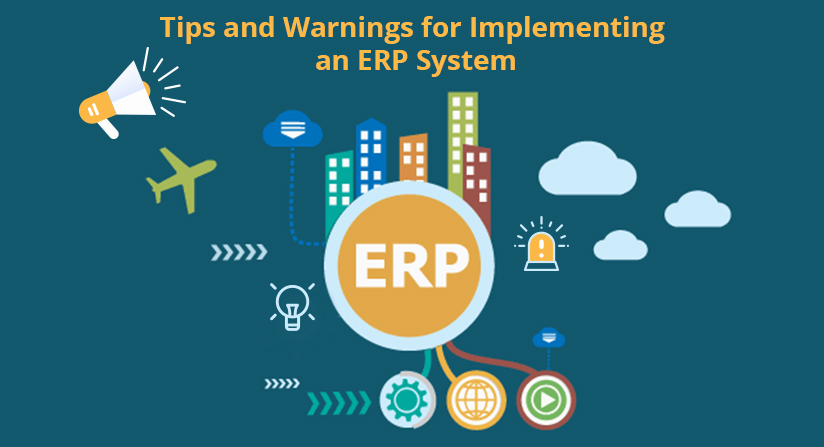Tougher competition in the market encourages businesses to better optimize resources, ensure customer satisfaction, and improve productivity.
An Enterprise Resource Planning solution helps manufacturing organizations optimize business operations to increase growth.
Selecting an ERP is a complicated and time-consuming task that requires exhaustive research and evaluation of multiple options. It is critical to ensure that the results of deploying an ERP are streamlined operations and real-time data visibility.
Once you’ve chosen the right ERP software for your business requirements, the next step is software implementation. But what exactly is implementation and what is involved with it?
What is ERP Implementation?
ERP implementation is a process of installing the software, transferring the business data to the new system, configuring users and processes, and training the employees on how to use new software.
There are different stages of ERP implementation processes – identify the objectives and set the target, plan, monitor and measure the progress rate, gather detailed requirements for satisfying customers’ needs, deployment of the software, and the post-go-live processes.
As per The Robbins-Gioia Survey (2001), 51% of businesses viewed their implementation as unsuccessful.
It may be because they have chosen an unsuitable ERP for their organization or maybe because they have chosen the wrong ERP implementation partner. It may take weeks, months, or even years to implement an ERP, depending on the size, nature, and requirements of businesses.
For a successful implementation, you need to work diligently and understand the pain points you need to overcome to avoid:
1. Selecting the wrong ERP software
The problem – Most businesses buy ERP without properly assessing it and knowing the organization’s needs.
The solution – Every business is unique with different technology needs, operations, and processes. The selection of an ERP is quite a tedious, time-consuming, and mind-boggling process that needs you to evaluate multiple options that will serve the purpose of your business.
Capterra researched and found that approximately 33% of ERP buyers did not demo the software before investing in it. And 22% of the businesses were reported to buy the first ERP software they evaluated. This can be fatal for both the ERP buyers as well as the vendors who sell it. If you evaluate the ERP solutions and take time to analyze how they can help you meet your goals, it will reduce extra customization costs and implementation time.
2. Poor planning
The problem – Businesses don’t understand the amount of money, time, and resources that are required.
The solution – Whether it is about manpower or money, it is always advisable to create a roadmap early on. It should be ensured that no steps are missed to ensure a successful implementation.
It is important to identify the actual objectives behind ERP implementation and which areas will be improved by it. Also, inadequately defined goals and lack of attention lead to unnecessary overhead costs.
Because of poor planning, 63% of the ERP implementations reached exorbitant prices and on average, implementation time was exceeded by four months from the expected date – as per the 2014 ERP report.
3. Reluctance to adapt
The problem – Not every employee in your company will be comfortable with the new ERP software.
The solution – Employees working in any organization become resistant to change. They have been working on the old system and feel comfortable with it. It’s important users also learn to be comfortable with the new ERP system by providing them with training regarding its need, benefits, and usage.
ERP is an intangible asset that will add to business productivity by unifying data in one system and making it accessible across every department, irrespective of location. Your employees should understand this and be interested in learning how to use it. Strong leadership in the implementation can help build employee excitement around the ERP system and benefit the quality of the implementation.
4. SMEs fail to focus on the future progression of business
The problem – Organizations fail to understand the need and scope of ERP.
The solution – What is the reason for getting the software implemented? Of course, you foresee business growth, productivity, and an increased bottom line. However, every small and mid-sized business should clearly define its operational processes to help clearly define how you need the ERP solution to help your business. You need specific goals so you can work with the vendor to ensure you accomplish what you want.
For example, you should know the pros and cons of on-cloud deployment vs. on-premise deployment. If you choose a cloud system, then understand its prerequisites such as proper internet connectivity, subscription-based payments, remote implementation, and more.
For on-premise deployment, you should understand the upfront fees, dedicated IT personnel needed, and the fact that you’ll need up-to-date servers.
Take time to evaluate your needs and then select the deployment type that fits your unique business requirements the best.
5. Knowledge transfer and training
The problem – Most of the ERP implementations fail to deliver productive results. Reasons may be inappropriate customization, ill-trained personnel, both, or something else.
The solution – As per research by Panorama Consulting, 21% of ERP implementations fail because of the aforementioned reasons. Needless to say that training is one of the most significant aspects of an ERP implementation process to ensure staff can effectively use the software.
With the proper understanding of how the ERP system works, you can identify the glitches in the organization and redesign your business processes. By giving proper training sessions to the users, they can learn and run the ERP system at a faster pace and it will give them confidence.
If you have any questions about the ERP implementation process or if you want to learn more about how an ERP implementation works, please feel free to contact us at info@optiproerp.com.
OptiProERP is a trusted manufacturing ERP software that combines HR, production, quality control, CRM, and other industry-specific tools into one system.
Follow Us




